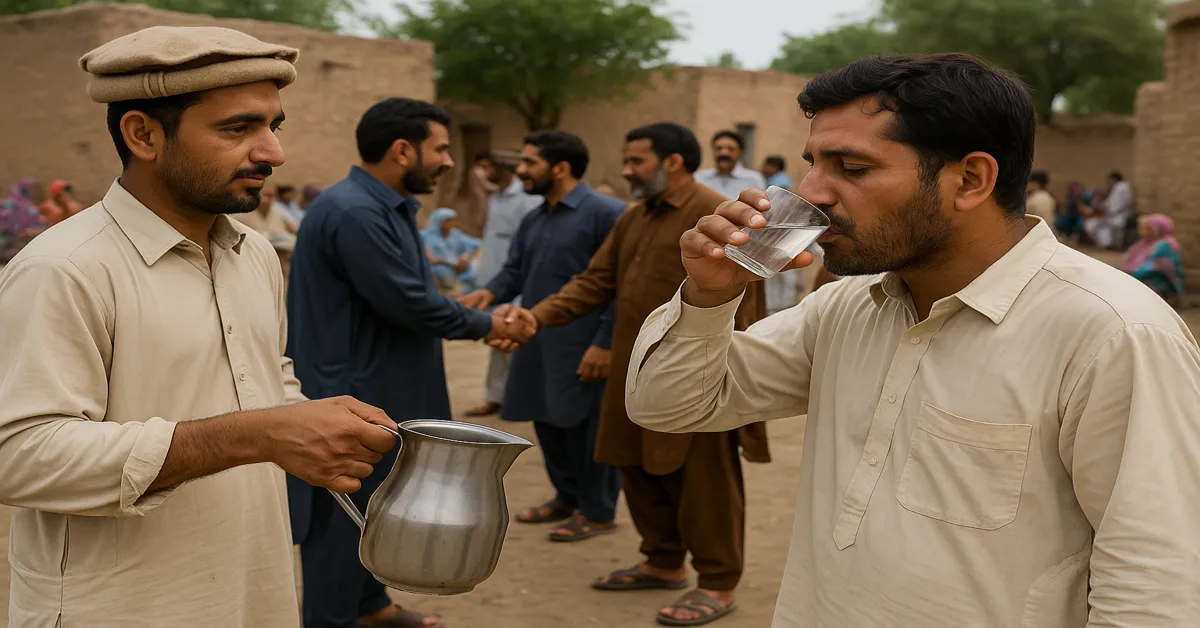Last Updated: July 2, 2025
Hidden Health Hazards in Village Gatherings: How Shared Glasses and Unwashed Hands Spread Disease

In the heart of Pakistan’s rural life, there lies a beautiful tradition of unity and hospitality. Weddings, funerals, religious ceremonies, and other village functions are social magnets, pulling together neighbors and relatives from far and wide. But amidst this warmth and togetherness, there are often overlooked health risks that can have serious consequences for entire communities.
The Tradition of Sharing — A Double-Edged Sword
It is not uncommon in Pakistani villages to see guests at a function drinking water from a single glass passed from person to person. Similarly, greetings through handshakes and eating meals with unwashed hands — sometimes straight from communal dishes — are routine. These practices, while rooted in culture and limited resources, can silently contribute to the spread of infectious diseases.
Waterborne Diseases: A Real Threat
When dozens of people drink from the same glass, especially in outdoor or crowded settings, it creates a perfect channel for the transmission of pathogens. If just one person has a virus or bacteria in their saliva, it can easily be passed on to the next person — and then the next, creating a domino effect. Some common waterborne diseases that can spread this way include:
- Hepatitis A and E: Transmitted via oral-fecal route, these liver infections can spread if hygiene is poor.
- Typhoid Fever: Caused by Salmonella typhi, often due to contaminated water or utensils.
- Gastroenteritis: Symptoms like diarrhea, vomiting, and abdominal pain caused by various viruses and bacteria.
- Strep Throat: A bacterial throat infection that can pass through saliva or shared utensils.
- COVID-19 and Influenza: Respiratory viruses that can also survive on shared surfaces like glasses and spread through droplets.
The Danger of Unwashed Hands
Many people, especially in rural areas, do not wash their hands before meals — either due to lack of awareness or limited access to clean water. After shaking hands with dozens of people at a gathering, those same hands go directly to food and mouths. This seemingly harmless act can transmit a wide range of infections, including:
- Worm Infestations: Such as roundworms or hookworms, often spread by dirty hands contaminated with soil or fecal matter.
- Shigellosis: A bacterial infection causing bloody diarrhea and stomach cramps, commonly spread through poor hand hygiene.
- Hand, Foot, and Mouth Disease: Common among children but highly contagious through direct contact.
- Conjunctivitis (Pink Eye): Spread by touching the eyes with infected hands.
- Common Cold and Flu: Viruses that easily transfer from surfaces or hand-to-mouth contact.
Why These Practices Persist
There are several reasons why these habits continue in rural settings:
- Limited Resources: Many villages lack running water or sufficient utensils for large crowds.
- Cultural Norms: Sharing is seen as a symbol of respect, closeness, and trust.
- Lack of Awareness: Many people are unaware of how diseases are transmitted through touch or saliva.
- Absence of Health Education: Public health campaigns often don’t reach remote rural populations.
Consequences on Community Health
Infectious diseases don’t just impact individuals — they spread quickly in close-knit villages. A single gathering can lead to an outbreak affecting entire families or even neighborhoods. Medical facilities are often far away or inadequately equipped to handle such outbreaks, leading to prolonged illness, missed work, and sometimes even death — especially among children and the elderly.
Breaking the Cycle: Simple Steps for Safer Gatherings
Improving hygiene doesn’t mean abandoning cultural values. It means enhancing them with health and safety. Here are some practical steps villages can take:
- Use disposable cups or ensure each person brings their own glass.
- Encourage handwashing with soap before meals and after handshakes.
- Keep hand sanitizers at function entrances if water is unavailable.
- Educate communities through local mosques, schools, and health workers.
- Promote the use of serving spoons and individual plates during meals.
Conclusion: A Community’s Health is Everyone’s Responsibility
The customs and traditions of rural Pakistan are precious and worth preserving. But small, mindful changes can protect these communities from avoidable suffering. By understanding the link between shared utensils, unwashed hands, and disease, villagers can make healthier choices without giving up their sense of togetherness. After all, a truly hospitable host is one who cares for their guests’ health as much as their comfort.
Let culture be a bridge to health, not a barrier to safety.
You May Also Like:

Can the Samsung Galaxy S25 Ultra with Xreal AR Glasses Replace Your Laptop?...

Pancreatic Cancer mRNA Vaccine: A Ray of Hope Amidst a Deadly Disease...

Lahore Smog Emergency 2025: Causes, Health Risks, Govt Actions & Safety Tips in Pakistan...

The Silent Strain: How Remote Work is Fueling a Global Mental Health Crisis...

Resilience on Court: Monica Seles and Other Athletes Who Fought Hidden Battles...

The Hidden Cost of Free AI Tools: How You’re Paying With Your Personality Data...

The Hidden Reason Why Cricket Is Losing Young Fans Worldwide...

